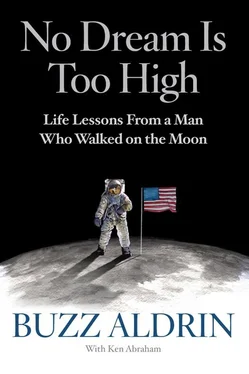Like a blowtorch, the capsule erupted in flames. Just as he had trained, Ed White struggled to open the hatch, but this time, it was not a test and the astronauts did not even have the 90-second wiggle room. Within a minute, the command module ruptured, causing an outrush of gases and creating an inferno inside the capsule, followed by deadly concentrations of carbon monoxide. The three astronauts trapped in the wall of fire never had a chance.
Ironically, none of our previous astronauts in the Mercury or Gemini programs had ever incurred a scratch, and NASA’s most horrific space program accident took place not in space, but while the astronauts were still on the launchpad at Cape Canaveral. The Moon, which had seemed within reach a few hours earlier, now seemed out of sight.
Ed was my good friend and colleague; he was also a major part of my inspiration to become an astronaut. In a couple of minutes, his storied life was over. I never had a chance to thank him for all that he had meant to me, or to tell him goodbye, although two and a half years later, I carried with me to the Moon a medallion in his honor. In some way, I have tried to honor Ed by the path that I have pursued.
Life is a gift, and none of us has any guarantees about tomorrow, so don’t miss the opportunity to tell your friends and family members how much they mean to you. Take the time to make that phone call just to say hello, or to write that note of encouragement.
In this day of text messages, email, and social media communications, if you really want to make an impression on someone, write a handwritten note of thanks or encouragement.
* * *

OVER THE YEARS, I’VE BEEN PASSIONATE about trying to reunite all of our Apollo astronauts, but it has not been easy to get everyone together. I want them to care as much as I do. Some of them may feel that they no longer have much to contribute to the space program, so they aren’t as interested in talking about future exploration. On the other hand, I feel that I’m not done yet.
Apollo astronauts were friends, but it was tough to maintain a sense of normalcy, especially for the crew of Apollo 11, the first mission to land on the Moon. Most of the other guys in the Apollo program have remained close with their particular crews, but Neil, Mike, and I had a tougher time of it. At one point, Neil and I went years without seeing each other. Although we remained friends, we rarely got together socially, except at special U.S. presidential commemorations of the Apollo 11 mission, which have taken place at the White House every five years since the initial landing on the Moon.
Mike Collins and I still keep in touch, although at the beginning of every phone call, Mike is always quick to remind me, “Buzz, I don’t want to talk about Mars!”
“Okay, right, Mike. But you know that scientists at Purdue University have now proven that my Mars Cycler will work …”
“Buzz!”
On a trip to Arizona, I was talking with Gene Cernan, commander of Apollo 17 and currently known as “the last man to walk on the Moon,” about the future of space exploration, and I was getting on his case. “Gene, why are you advocating that we go back to the Moon? We don’t need to be competing with other countries to go to the Moon. Don’t you realize that we don’t have a big budget, and we’d be wasting money, time, and energy?”
“Buzz, I don’t know what you know. All I know is that I think we need to be going out farther into space.”
“We’ve got to find a way to go beyond the Moon,” I prodded him.
“I don’t know anything about that, Buzz. You obviously know much more than I do. All I know is that we need to be out there.”
“So you admit that you know nothing!”
Even today, when any of the Apollo astronauts get together, there is a strong sense of camaraderie mixed with a very real sense of competition. Of the 24 Apollo astronauts that reached the Moon, 12 of us actually landed on the Moon’s surface. Yet, after nearly half a century, we are still competitive with each other. It’s a strange brew, but we cherish our friendships, and just as iron sharpens iron, we continue to bring out the best in each other.
The late entrepreneur and motivational speaker Jim Rohn often said, “You’re the average of the five people you spend the most time with.” What he meant by that, of course, is that the people with whom you repeatedly choose to associate will have an enormous impact on you, either positively or negatively. That’s why I say, Show me your friends and I will show you your future.
Choose friends who will bring out the best in you.
• CHAPTER FOUR •
SECOND COMES RIGHT AFTER FIRST.

On the television show The Simpsons , Homer asked me how it felt to be the second man on the Moon. I told Homer, “Second comes right after first.”
Who wants to be number two? You never see a team running off the field after a game, shouting, “We’re number two! We’re number two! ”
No, everybody wants to be number one.
Truth is, for years, I bristled at my notoriety, being known as “the second man on the Moon.” My father even made strident efforts to get the official U.S. Postal Service stamp to say “First Men on the Moon,” rather than “First Man on the Moon.” The Postal Service opted for “First Man.”
Making matters worse, in the “normal” patterns of NASA and the space program, I should have been the first person to walk on the Moon. Neil was the commander, and I was the pilot. The commander normally stayed with the spacecraft while the junior officer under his command left the spacecraft to perform the EVAs. The commander had an enormous responsibility, not to mention additional training requirements, so in all previous missions, if a crew member was to spacewalk, it was always the junior officer rather than the commander. That was the way NASA had operated in every other launch prior to Apollo 11.
But NASA changed its procedures just prior to our launch. Neil, it was decided, would be the first person to set foot on the lunar surface. Once NASA decided that the mission of Apollo 11 would include an attempted landing, everything changed. We all understood that this would be different; besides being historic, two people would leave the spacecraft, not one.
When the word got out, several of my colleagues said, “This isn’t right, Buzz. You should be the first one to set foot on the surface.” Others, however, felt that the symbolism of the pioneer explorer arriving at his destination demanded that the commander of the mission be the first to set foot on the Moon.
Although I was excited about the possibilities of our mission, I wasn’t interested in trying to manipulate opinions at NASA, or pushing to be number one. I had even expressed to my wife my misgivings about being a crew member on the first mission to the Moon, suggesting that I would rather be involved in a later trip to avoid the publicity and media frenzy and other hoopla that would most assuredly accompany the initial lunar landing. I had experienced a major dose of that sort of public spectacle after I returned to Earth following my successful space walk during Gemini 12. Although I was grateful for the many kind gestures and words expressed to me, the enormous amount of attention I received everywhere I went was overwhelming. I could barely step outside our home without being swarmed by media or fans. Nor could my mother. I’m convinced that the emotional overload following my Gemini success was a major factor in my mother committing suicide the year before I went to the Moon. That’s why, given a choice, I would have preferred a later mission rather than the initial landing.
Читать дальше














